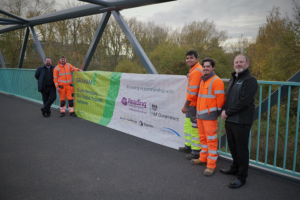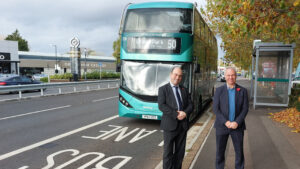Reading Borough Council’s £8m investment in the town’s highways will continue with up to 105 more residential roads set to be surfaced in the coming year.
In addition to residential roads, up to 90 of Reading’s major roads most in need of repair will also receive surface treatment over the year. The use of advanced technological equipment such as scanner surveys and video survey assessments have advised the Council which roads need to be prioritised for improvement.
A report published ahead of next week’s Housing, Neighbourhoods and Leisure Committee sets out the proposed spend on residential roads, pavements, bridges and structures for 2024/25. This is made up of the Council’s own investment along with Department for Transport grants and will include:
*£3.75m on residential road resurfacing
*£650,000 on pavement resurfacing
*£350,000 on carbon reduction and innovation.
The investment is in response to the 2023 residents survey, which is carried out annually and showed that whilst the Council has been investing significantly in its roads, a third of residents were eager to see roads and pavements further improved. The Council’s first successful £9m investment programme in residential roads concluded last year. Between 2020 and 2023 that investment was able to dramatically increase the proportion of residential roads in good condition from 35% to now 80%, and therefore not requiring further immediate attention.
Taken together, the investments in new road surfaces by the Council make up Reading’s biggest road repair programme on record.
The Council is committed to reducing carbon as much as possible during these improvements, and this has seen around 450 trees planted along Reading’s highways since the resurfacing work started in 2020, with plans to contribute substantially again to the Council’s tree planting this year. Innovation in carbon reduction has been at the forefront of the work with the recent purchase of a fully electric line marking machine which uses a more environmentally friendly, cold-applied paint, and increasing the use of low-carbon resurfacing materials throughout the Streetcare team. The increased use of more recycled material and ensuring our contractors have robust carbon reduction plans that match the Council’s own net zero plans are all part of the ongoing carbon reduction innovation that the Council’s Streetcare team has been putting into place.
The report also highlights that Reading will receive an additional £7.726m of Department for Transport funding for road resurfacing following the reallocation of the High-Speed Rail (HS2) budget for 2023-34. It also notes the progress of an enhanced 2-year long £4m investment in bridges and structures that is allowing the Council to address those structures most in need of improvements as the Council maintains around 80 bridges and 300 other structures throughout the borough.
Karen Rowland, Lead Councillor for Environmental Services and Community Safety, said: “I’m delighted that the momentum we’ve built up in tackling our residents’ number one concern for improved roads is continuing. The proportion of residential roads classified as being in “good condition” has risen sharply from 35% to 80% which shows that our investment has been overwhelmingly successful. Consequently there has also been a noticeable reduction in the number of actionable potholes since the programme commenced, but we intend to make further advancements by improving the quality of Reading’s roads for residents. This will be achieved through exploring innovations with new lower carbon road surfacing techniques and materials.
“I’m proud of the fact that our Highways team has won awards for improving our roads in a manner that simultaneously drives forward innovation in reaching our ambitious Net Zero Carbon pledge by 2030. Our roads are already showing that difference.”























